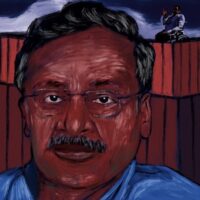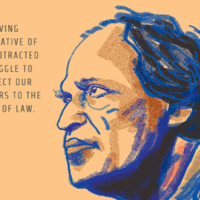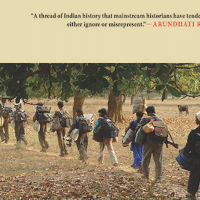-
“Why do you fear my way so much?”
Professor Saibaba’s life, or rather, Sai’s life, for that is what his friends called him, cannot be adequately understood without situating him in an authentic history and “present as history” of the Indian society of which he was a part.
-
Environmental injustice in India: Jaduguda Uranium Mining Cluster
Adivasis (literally, “original inhabitants”, equivalent to “indigenous peoples”) have been and are being sacrificed in the union government’s uranium mining and processing projects in what is now the State of Jharkhand, earlier the State of Bihar, where the public enterprise, Uranium Corporation of India Ltd (UCIL) began underground uranium mining and processing plant, twenty-four km west of Jaduguda.
-
Monthly Review School and “The Present as History”: An Introduction
The conception of the present as history crystallized into an important principle of the intellectual tradition of Monthly Review magazine. Viewing the present as history entails combining what is new with a grasp of the longer process that is vital to a deeper understanding of the present. This Introduction provides an initiation to the intellectual tradition of Monthly Review, from which we have selected the essays and the interview that appear in The Present as History 2021.
-
People’s lawyer P. A. Sebastian and the Socialist Project
Sebastian, in his writings in The Fight to Win Rights, is direct, and honest, unafraid to state unpalatable facts. Blunt and matter-of-fact, his words seem to be deliberately chosen to appeal to the conscience of people, his mode of expression reflecting his commitment to justice and the truth.
-
On some peremptory ‘critiques’ of India’s Maoist movement
Revolutions are very costly in terms of human lives and suffering, and so “we” are shocked that “you” radicals even consider them as options. And so “we” have to express “our” rejection and condemnation.
-
What makes an Urban Naxal?
The Bharatiya Janata Party-led government and the Hindutvavadi “nationalist” movement’s demonic drive for cultural orthodoxy seems to know no bounds. What is alarming is the former’s support for and complicity in the acts of the latter, as also the Indian state’s control of its “necessary” enemies through the use of state terror, with the category “urban Naxals” singled out in the latest of such drives (in June and August 2018) that otherwise routinely target Muslims, militant oppressed nationalities, and “Maoists.”
-
Karl Marx: ‘ruthless criticism of all that exists’
Two hundred years after Marx’s birth, the challenge is to reinterpret the world using his mode of thought and his method and in the process, critique the old interpretations which we have inherited.
-
Bernard D’Mello on revolution in the global south
From the time of independence in 1947, India has had the resources and the potential to achieve a high level of human development—yet the great majority of the country’s people have remained desperately poor.
-
The Revolutionary Legacy of Bhagat Singh: An Interview with Chaman Lal
Chaman Lal retired as professor of Hindi translation from the Centre of Indian Languages, Jawaharlal Nehru University, New Delhi, and is now associated with the Centre for Comparative Literature as Professor-Coordinator at the Central University of Punjab, Bathinda. His most recent book is Understanding Bhagat Singh (Aakar Books, Delhi, 2013). BD: March 23 marks the […]
-
Rehabilitation of Liberation Theology
Christmas has just gone by, and we’ll soon be ringing in the New Year, a time when a “profound feeling of consolation and peace” overwhelms the faithful. But the buzz, created by Pope Francis’ “apostolic exhortation”, Evangelii Gaudium (EG, translated as “The Joy of the Gospel”), issued in late November, and the subsequent clarificatory […]
-
It’s in the (Indian) Air, Smells like Semi-Fascism
Public memory of how (the) fascists “use[d] and abuse[d] democratic freedoms in order to abolish them” (Hannah Arendt) was strong when, more than 60 years ago, India’s Constituent Assembly rejected the option of a presidential type of executive. But now, the coming general elections are being framed as a presidential-style contest between the Bharatiya Janata […]
-
On a Long March: Sanjay Kak’s Red Ant Dream
Red Ant Dream / Maati Ke Laal (2013) 120 minutes; English version, with subtitles Direction: Sanjay Kak Photography: Ranjan Palit, Sanjay Kak and Setu Sound Design: Madhu Apsara Writers: Sanjay Kak and Tarun Bharatiya Editing: Tarun Bharatiya www.redantdream.com You are far away from the sterile atmosphere of much of academia with its politically correct […]
-
All in the Name of the Poor
Why is there little or practically no information in the 2013-14 budget on Prime Minister Manmohan Singh and Finance Minister P Chidambaram’s pet scheme to bring about direct cash transfer payments to eventually replace price subsidies for food, fuel and fertiliser products? Who are going to be the real beneficiaries of the direct cash transfers […]
-
‘Naxalbari . . . Will Never Die’: The Power of Memory and Dreams
Here is the full-text of what I said — as also, what I wanted to say but restrained myself because of the time constraint or because of my diffidence — at the book release of Gautam Navlakha’s Days and Nights in the Heartland of Rebellion (Penguin Books, 2012), organised by Sanhati at the Gandhi […]
-
Arundhati Roy, Anuradha Ghandy, and ‘Romantic Marxism’
a This is the full-text of the introductory remarks made by the author at the Fourth Anuradha Ghandy Memorial Lecture delivered by Arundhati Roy on 20th January 2012 at St Xavier’s College, Mumbai. I woke up this morning to the chirping sounds of the swallows. Arundhati Roy seems to have brought in those love-birds that […]
-
Indian ‘Republic Killing Its Own Children’ — Kishenji Fought for a Better World
India’s Union Home Minister P Chidambaram, West Bengal Chief Minister (also in charge of the province’s home affairs) Mamata Banerjee, Union Home Secretary R K Singh, and the top bosses of the security forces involved in the operation have all been bent on establishing one point: that the alleged encounter in the Burishol forest […]
-
Figuring ‘It’ Out, Putting ‘It’ to Use
As I have understood the task at hand, the editors of Aneek expect me to respond to the question: Is ‘Maoism’ in India an authentic application of ‘Marxism-Leninism-Mao Zedong Thought’? Frankly, I am not comfortable with such a positing of the question for it seems to suggest one “correct” interpretation of ‘Marxism-Leninism-Mao Zedong Thought’ […]
-
The Revolutionary Road in India
The editors of Aneek have asked us to present, in brief, our stand regarding what we think is “the correct path” towards equality, cooperation, community, and human solidarity, that is, socialism in India. The struggle for socialism is going to be long, hard, and violent, and I, for one, cannot imagine a socialist India […]
-
‘Rich People Always Get Away’: Bhopal — Chronic Denial of Justice
Anxiously waiting outside the court of the chief judicial magistrate Mohan Tiwari in Bhopal on 7 June, 36-yearold Raghu Jaidev and many other victims of the Bhopal catastrophe were crestfallen, some of them, outraged, upon hearing the verdict of the trial that had lasted 23 long years. “Rich people always get away”, said Jaidev, […]
-
Maoist Movement in India
Listen to the Interview: Bernard D’Mello: This insurgency actually goes way back to 1967. It is in the context of deepening underdevelopment, in particular in parts of India, more specifically parts of central and eastern India. The Maoist movement has evolved over time, it has learned from its mistakes, and it has regenerated itself […]








